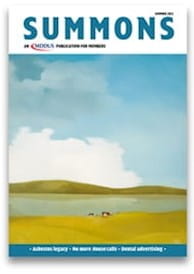AMONG the many events planned to mark the 2012 Olympic and Paralympic Games in London was the unveiling of a statue in honour of a pioneer in the field of rehabilitation of spinal injury patients, who has been admired by disabled athletes the world over.
Sir Ludwig Guttmann was a man of courage and determination who worked tirelessly to prove that patients once dismissed as “hopeless cases” could have active lives as productive members of society. Such determination can be traced back to his early experiences.
Guttmann grew up in Königshütte, 100 miles from Breslau. As a young man he led a youth group, enjoyed sport and choral singing. During World War I he volunteered as a medical orderly in the Accident Hospital for Coal Miners and there met his first paraplegic patient, a young miner with a fracture of the spine. As he began to write up his notes, he was told: “Don’t bother, he’ll be dead in a few weeks.” Sure enough, the young man succumbed to an infection five weeks later, but Guttmann never forgot him.
A septic throat kept Guttmann from active service and in 1918 he started medical studies at the University of Breslau where he was taught by, amongst others, the excellent Professor Otfried Foerster. This was followed by an MD in 1924 from the University of Freiburg. Invited back to Breslau to work with Foerster, he performed complex surgery, researched methods of ‘electrodiagnosis’ and therapy and the physiology of sweat glands.
He gained more experience in charge of a special neurosurgery theatre in a psychiatric hospital at Friedricksburg, before unforeseen circumstance caused Foerster to beg him to return to Breslau. Although the Nazi threat to Jews was rising, Foerster was no anti- Semite and always remained a friend of Ludwig.
Anti-Jewish legislation forced Guttmann from his post and he moved to the Jewish Hospital in Breslau. Nazi atrocities grew but he declined offers of work abroad as he was “determined to resist as much as possible that system of suppression and cruelty”. However by 1938, now married with two young children, he finally accepted that his family would have to flee Germany. They arrived in England in 1939 with few possessions and little money.
With the sponsorship of leading neurosurgeon Hugh Cairns and support from charitable groups, Guttmann started his research at Oxford. In 1941 George Riddoch from the Medical Research Council selected him to review the treatment of spinal injuries. His knowledge of new work by Theodor Kocher and by Wilhelm Wagner (once employed at Königshütte) combined with his own experience proved impressive. Guttmann was made the director of a new unit for patients with spinal injuries at the Stoke Mandeville Hospital, treating an increasing number of World War II casualties. By 1947 the unit had expanded to 90 beds with a team of well-trained staff.
The rehabilitation programme conceived by Guttmann was groundbreaking and showed a deep understanding of the psychology of his patients. His philosophy was “to transform a hopeless and helpless spinally paralysed individual into a taxpayer.”
Determined to reverse the trend of fatal sepsis in these patients, Guttmann also instructed staff to turn patients every two hours, to catheterise them regularly and he arranged for active physiotherapy and social activities. In Guttmann's words “the purpose of all remedial exercises in the period of reconditioning of the paralysed is to develop new tricks for making muscles move parts of the body formerly moved by other muscles”.
Sport was therapeutic and soon patients were playing basketball, table tennis and archery first within the hospital and then in matches organised outside. The competition grew and the first annual Stoke Mandeville Games for the Paralysed were held in 1948, with the motto “Friendship, Unity and Sportsmanship”. In 1952 a Dutch team of paraplegic war veterans visited making the Games international. As their success grew, the next step was to hold the Games in the country hosting the Olympics, which first happened in Rome in 1960. And so the Paralympic Games were born.
The Paralympic Games (as they were officially named in 1980) have since become a worldwide phenomenon, enjoyed by a global audience of millions. At this year’s London 2012 Games, the Guttmann Stadium at Stoke Mandeville will play an important part in welcoming many teams, especially as a training centre. A life-sized bronze statue of Guttmann, affectionately known as Poppa, now stands outside the National Spinal Injuries Centre in Stoke Mandeville where he was director for 22 years from 1943.
Guttmann’s pioneering work influenced rehabilitation centres around the world. He was naturalised a British subject soon after the war. An OBE in 1959 was followed by a CBE and he was knighted in 1966, the year before he retired. FRS in 1976 brought him the most joy.
Determined to the end, when the Spinal Injuries Centre was threatened with closure in the 1970s, Guttmann countered with a vigorous appeal supported by patients who chained themselves to their beds. The late Sir Jimmy Savile also supported the centre, raising £10million in three years. The centre was eventually rebuilt in 1983 with Sir Jimmy as its patron.
References
• Spirit of Stoke Mandeville, the story of Sir Ludwig Guttmann. Susan Goodman, Collins, London, 1986
• The specialty of spinal injuries in the UK. Silver JR. J R Coll Physicians Edinburgh 2009:39. 79-67
Julia Merrick is a freelance writer and editor in Edinburgh
This page was correct at the time of publication. Any guidance is intended as general guidance for members only. If you are a member and need specific advice relating to your own circumstances, please contact one of our advisers.
Read more from this issue of Insight

Save this article
Save this article to a list of favourite articles which members can access in their account.
Save to library